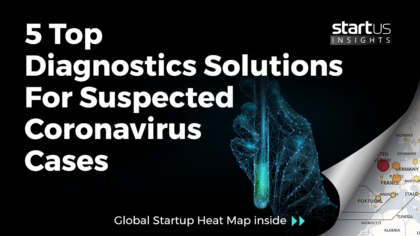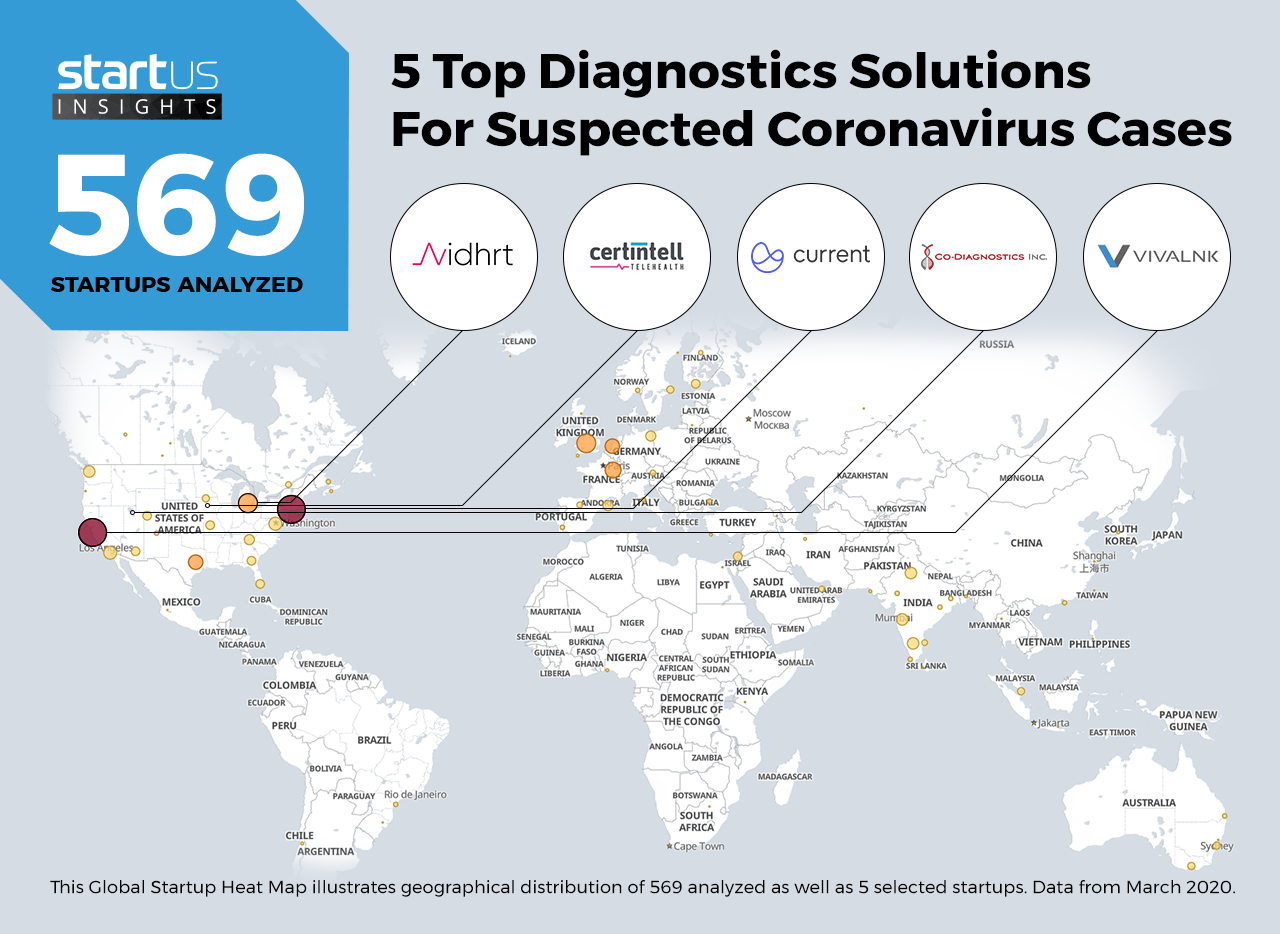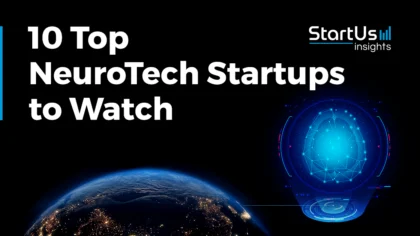Accelerate Productivity in 2025
Reignite Growth Despite the Global Slowdown
Our Innovation Analysts recently looked into emerging technologies and up-and-coming startups working on diagnostics solutions for suspected coronavirus cases.
Heat Map: 5 Top Diagnostics Solutions
We use a data-driven startup scouting approach to identify the most relevant solutions globally. The Global Startup Heat Map below highlights 5 interesting examples out of 569 relevant solutions. We analyzed technology-driven solutions that enable diagnostics for COVID-19. Avidhrt, Certintell, Current Health, Co-Diagnostics, and VivaLNK develop 5 top solutions to watch out for.
Avidhrt – Mobile Diagnostics
In addition to body temperature, heartbeat rate, respiration rate, and blood pressure are the most crucial bodily parameters. During viral outbreaks such as the coronavirus pandemic currently underway, it is not feasible for doctors to attend to a large number of at-risk patients or those suffering from unrelated conditions. Mobile diagnostics devices for patients that alert doctors when any interventions are needed.
The US-based startup Avidhrt manufactures a hand-held, portable, clinical-quality platform that combines an electrocardiogram (ECG), pulse oximeter, and temperature recorder in a single device. The device also allows patients to record their ECG whenever and wherever they want and then share the results with their doctors. The solution uses machine learning algorithms to identify anomalies in the record to prevent diseases and, together with their web platform, eliminates the need for regular in-person visits to the doctor.
Certintell – Telehealth
During pandemics such as the coronavirus outbreak, people are advised to practice social distancing and limit going out. Telehealth platforms are an attractive alternative and allow patients to communicate with doctors from the comfort of their homes. Even otherwise, these solutions serve patients who cannot visit the hospitals regularly for routine checkups. These include patients suffering from chronic ailments, undergoing the transition from hospital to home, or those living in remote areas.
Certintell, a US-based company, offers a HIPAA compliant, cloud-based telehealth platform. The platform makes healthcare consultations more affordable and brings them to underserved populations. Moreover, it is accessible from a web browser or via an app for mobile phones and tablets. The solution combines a comprehensive set of tools that are geared towards chronic care, transitional care, remote patient monitoring, psychiatric collaborative care, and behavioral health.
Current Health – Remote Patient Diagnosis
Global pandemics cause thousands of deaths and the hospitalization of millions of people. This overwhelms healthcare systems and leads to a severe lack of hospital beds and intensive care units (ICUs), as has been seen during the current coronavirus pandemic. Remote patient diagnosis offers a way to ease the burden on clinics and hospitals while also preventing more patients from getting infected.
Current Health, a US-American startup, provides an ecosystem of device integrations that enable remote patient diagnosis. Their wearable sensor uses artificial intelligence to identify at-risk patients earlier and minimizes alarm fatigue. The sensors monitor a range of health parameters and provide ICU-level accuracy at home. The startup’s HomeHub transmits data over cellular from environments that may not have a strong WiFi or internet connection, such as rural environments. In the wake of the coronavirus pandemic, their solution provides the opportunity to diagnose early symptoms in suspected cases. Moreover, it facilitates the early discharge of non-COVID-19 patients to maintain hospital capacity.
Co-Diagnostics – Detection Kits For Infectious Diseases
Molecular diagnostics solutions that detect ribo- or deoxyribonucleic acid (RNA/DNA) or protein markers in samples enable highly specific and sensitive diagnostics. Detection kits based on molecular tools diagnose a range of infectious diseases, such as those due to bacterial or viral infections, and even various cancers. Startups are working on detection kits to prevent and halt the growth of pandemics, such as the coronavirus outbreak.
Based out of the US, Co-Diagnostics develops innovative molecular diagnostics solutions to detect infectious diseases. The company uses a patented version of a real-time polymerase chain reaction (RT-PCR) to rapidly detect specific fragments. Their proprietary solution CoPrimersTM virtually eliminates primer-dimers that cause false positives in nucleic acid-based diagnostic tests. The startup offers RapidProbeTM assays that are sensitive enough to detect a single virus in a DNA sample. Currently, they are producing Logix SmartTM kits, an in-vitro, qualitative, diagnostic test to detect COVID-19, for the US market, as well as shipping them to multiple countries worldwide.
VivaLNK – Continuous Temperature Monitoring
Body temperature is a vital parameter that indicates fevers related to illness. A sustained elevated body temperature necessitates immediate medical attention. During viral outbreaks, the use of conventional thermometers to measure body temperature is not a safe option. Non-invasive solutions eliminate the need for healthcare workers to come in contact with patients. Moreover, they allow for continuous monitoring for at-risk patients to diagnose early symptoms.
VivaLNK is a US-based company that builds medical wearable sensors for continuous monitoring of patients. One of their solutions, Fever Scout, monitors and analyzes body temperature in real-time, even during sleep. It notifies caregivers on their mobile devices if the patient’s temperature crosses a threshold value. The solution applies to viral infections, post-op fevers, child fevers, flu infections, and drug effects. Recently, the Shanghai Public Health Clinic used VivaLNK’s continuous temperature sensors to tackle the spread of coronavirus in China.
How To Flatten The Curve?
This is an unprecedented situation for many of us across the world. The SARS outbreak in the early 2000s claimed 774 lives. That toll was enough to drive research & development and easier healthcare solutions. The fact that several mobile health, e-health, remote health, and diagnostics startups and companies are able to respond during a real epidemic is encouraging. With thousands of deaths already, we expect to see numerous new companies offering technology-driven solutions to help doctors, nurses, other health workers, and the larger public.








